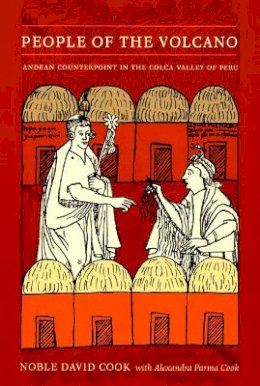Noble David Cook is Professor of History at Florida International University. He is the author of Born to Die: Disease and New World Conquest, 1492–1650; The People of the Colca Valley: A Population Study; and Demographic Collapse: Indian Peru, 1520–1620. Alexandra Parma Cook is an independent scholar. They are the coauthors of Good Faith and Truthful Ignorance: A Case of Transatlantic Bigamy and the coeditors and translators of The Discovery and Conquest of Peru, by Pedro de Cieza de LeÓn, both also published by Duke University Press.
“People of the Volcano is simply the best micro-regional account of colonial Peru available in English. It sets a new standard for ethnohistorical research in Spanish America.”-David J. Robinson, Dellplain Professor of Latin American Geography, Syracuse University “Noble David Cook’s People of the Volcano is a masterpiece of history writing. The story is set in one of the most rugged and dramatic landscapes in the Andes-the Colca Valley, in the southern highlands of Peru, near the city of Arequipa. From his close reading of the Spanish chronicles and administrative documents, Cook fashions a virtual ethnography-the closest approximation we are likely ever to have of a “thick description”-of everyday life in the Colca Valley during the sixteenth and seventeenth centuries. This was the period when the inhabitants of this remote valley were incorporated into the Inca empire, the last great state of the pre-Columbian Andean world, and then, following the Spanish conquest, when they became the unwilling and troublesome provincial subjects of the first global empire of the modern world, that of the Hapsburg kings of Spain. Cook’s account of the imposition of the sixteenth-century Toledan reforms in the Colca Valley will stand for many years to come as the most informative and readable account of this critical, transformative process in colonial Andean history.”-Gary Urton, Dumbarton Oaks Professor of Pre-Columbian Studies, Harvard University “The first chronological history, in English, of Peru’s Colca Valley, People of the Volcano displays Noble David Cook’s intimate knowledge of the valley’s geography, people, and past.”-Susan Elizabeth Ramirez, author of To Feed and Be Fed: The Cosmological Bases of Authority and Identity in the Andes “People of the Volcano provides rich and specific information on the sixteenth- and seventeenth-century Colca Valley that will be enormously useful to specialists in Andean studies. It also provides a fine-grained description of colonial institutions and the Spanish debates over control of indigenous peoples and how to manage extraction of resources from conquered communities. Its usefulness thus extends well beyond Andean studies.” - John Monaghan (Journal of the Royal Anthropological Institute) “People of the Volcano’s most compelling characteristic is the almost seamless way in which environmental, social, cultural, economic, epidemiological and ecclesiastical historiographical approaches. . . . People of the Volcano condenses effortlessly some three decades of research on the Colca Valley and its people. . . . The authors’ mastery of the sources allows them to bring to life the experience of both the indigenous and the Spanish colonizers. . . .[T]here is no doubt that this is a major piece of historical scholarship. . . .” - Paulo Drinot (EIAL) “The definitive work on the Colca Valley under Spanish colonial rule and . . . one of the best in . . . regional ethnohistories of native Andean societies.” (Hispanic American Historical Review) “Cook’s book is a masterful synthesis of methodologies from geography, demography, and anthropology. . . . Cook’s analysis of changes in the landscape evinces a familiarity with the geography of the region that, together with his extensive archival research, provides a fruitful approach for a regional study.” - Miguel Leon (Journal of Interdisciplinary History) “The research adventure of many years, following many twists and turns, has led to a fine book. . . .[It] is one of the best and most richly documented regional studies of indigenous peoples and Spaniards in the early colonial Andes to appear in some time. We ought keenly to await volume three in this trilogy.” - Kenneth Mills (American Historical Review) “This is an excellent book, which is very well researched and written. It gives anyone studying the Incas or pre-Columbian history a deep insight into their customs, history and administration. It does concentrate on the Colca valley, but through it the authors present an outstanding version of life during the Empire and the colonial period. I would recommend this book not only to historians, but to anthropologists and archaeologists who are studying the Incas as a culture.” - Robert Barker (Bulletin of Latin American Research)

